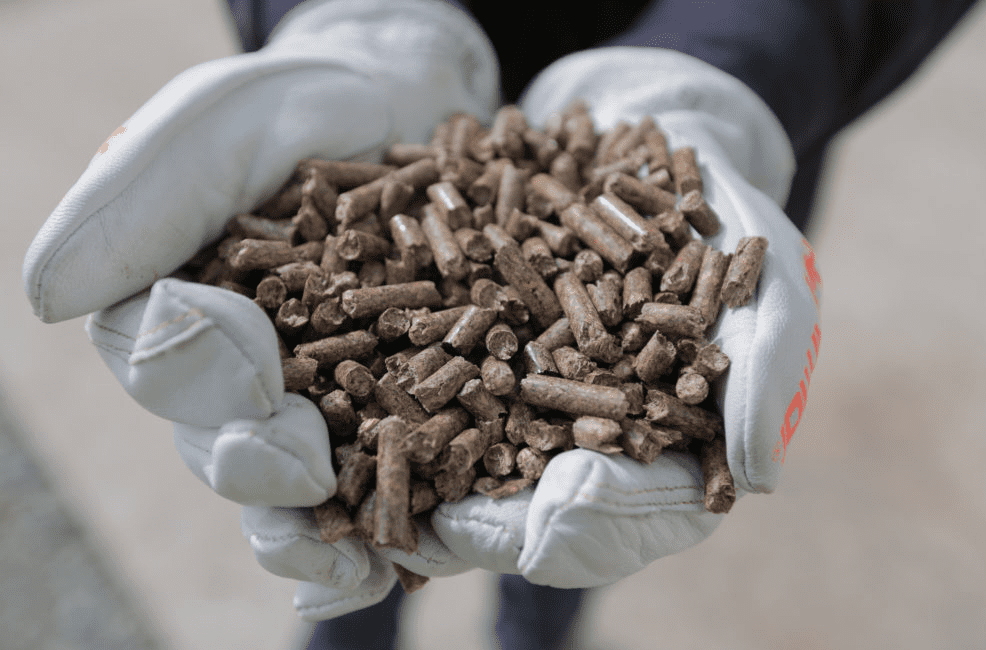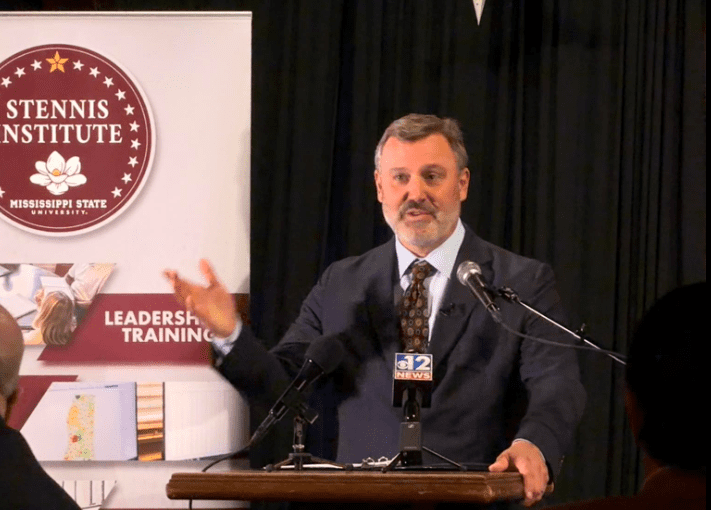
(Photo from Drax Group USA on Facebook)
- Residents raise emissions concerns, citing health impacts, while the company says it has invested $73 million in updated safety and pollution technologies over the last five years.
Despite strong opposition, the Mississippi Department of Environmental Quality (MDEQ) has granted a Gloster business permission to increase its air emissions, reversing its April decision.
During a highly emotional two-day hearing this week, opponents led by Greater Greener Gloster argued that Drax has a history of releasing pollutants into the air while making wood pellets. On the first day of the hearing, residents of Gloster overflowed MDEQ’s Jackson hearing room into the lobby.
Those against the permit were seen sporting t-shirts that read “Reject the Permit,” while Drax backers wore stickers with the company’s name.
Residents of the economically challenged, predominantly black rural community described their fight as a David versus Goliath battle, although in April, the DEQ denied Amite BioEnergy LLC, the parent company of Drax, a permit to increase air emissions. Soon after, the British wood pellet production company requested a rehearing.
Attorneys for Greater Greener Gloster said this is a case of a multinational corporation “putting profit over people.”
Krystal Martin, co-founder of Greater Greener Gloster, said Drax’s business practices are negatively impacting residents’ lives. In four hours of testimony on Tuesday, residents told of foul smells coming from the plant, loaded log trucks barreling down the highway, and dust that blankets cars and outdoor furniture. Their main concern, however, is the health impact on all age groups.
“We have so many people who have been impacted by health,” Martin said. “A lot of people in our community are suffering from upper respiratory illnesses; a lot of people suffer from COPD, lung disease, and people rely on oxygen daily.”
Sixty-year-old Curtis Harris is no longer teaching high schoolers about the Hemingway Hero or the Fitzgerald Flaws, but is now struggling to breathe, he said, while carrying an oxygen machine in one hand and a walking cane in the other.
Harris said his illness started with a slight cough shortly after Drax started operation in 2012. Since that time, his health has steadily deteriorated, and now it is difficult for him to talk and walk. He links his illness to the company’s emissions.
The company admitted in the past it had issues with emissions but noted that it has invested $73 million in safety and pollution technologies over the last five years.
Amite BioEnergy executives admitted the company had a history of state and federal environmental and record-keeping violations, paying nearly $2 million in fines to the state. In the second day of testimony before MDEQ, Amber Boshka, vice president of environmental sciences, said the company has since invested heavily in data monitoring, employee training, resulting in “checks and balances” improvements. She noted that the company has a third-party model showing no health impacts from its Gloster operations.
In a press statement, the company said, “MDEQs conditions, inspection regime, and our commitment to continue to invest in compliance and improving operational standards will ensure that Drax at Amite operates as safely as efficiently as possible, demonstrating our commitment to the safety and health of our colleagues and the community.”
During cross-examination, Greater Greener Gloster’s attorney asked if the new permit would increase production at the mill. Boshka said it would.
“So, this is putting profit before people,” asked Rebecca Romney, the group’s attorney, before sitting down and not letting Boshka answer.
Drax’s Executive Vice President Matt White said the company strives to be a good neighbor. He testified that the company pays its employees well, between $50,000 and $120,000 annually. White added that 75 percent of their employees live within an 11-mile radius of the company and they tend to heavily support local community organizations.
However, when asked, White said he did not know the exact number of employees who live within the municipal limits of Gloster, noting that his comments came from a Drax-funded survey.
White argued that Drax, which operates 17 wood pellet mills in North America, seven of which are in the U.S., “is a good corporate citizen,” adding that if the permit were not approved, the plant would shut down, leaving about 75 people jobless.
Gloster’s mayor, Jerry Norwood, did not testify at the MDEQ hearing but said after the verdict that if the ruling had gone the other way, the town would have lost more than $500,000 for its school system, and water and sewer rates may have increased.
“I know what goes on in the plant, and that little plant we have right there is not causing a problem. It has been an asset to Gloster,” the mayor said.
This issue has divided the community of less than 1,000 people, many who are related to one another by blood or marriage. Both sides of the debate bussed their supporters into the hearing, about two hours from Jackson.
When Mayor Norwood was asked how he plans to bring Gloster back together, he stared at the reporter and simply said, “No comment.”










